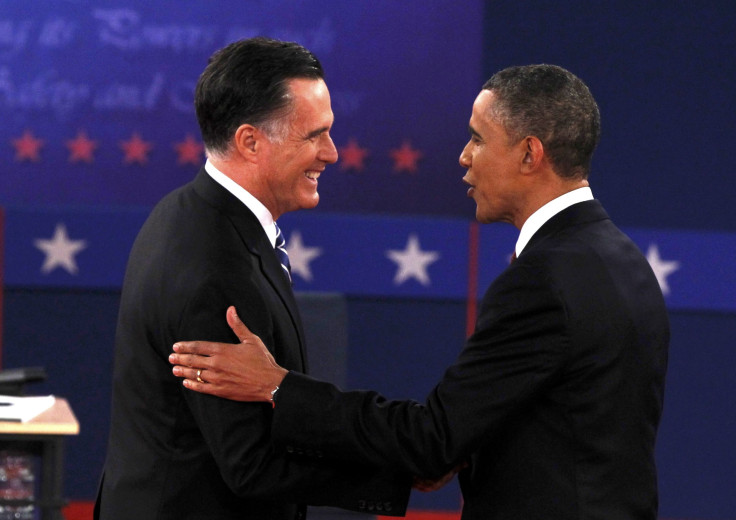If Romney Wins, It Won’t Be Because The Ladies Love Him
Analysis

Mitt Romney may have enjoyed a slight bump in the polls among female voters after he was declared the winner of the first presidential debate in Denver. But those gains likely will not persist after the second debate, when the Republican presidential candidate could not even say if he supported pay equity for women while he was -- literally -- on the national stage.
Instead, Romney let the audience know that, as he was governor of Massachusetts, he went out of his way to hire women for government cabinet positions. It was a weak and evasive answer reminiscent of Ann Romney awkwardly squealing “I love women” during the Republican National Convention (the event's big appeal to female voters). Because women obviously vote for the candidate loves them the most.
As it is, Romney’s story about going out of his way to ask women’s groups for “binders full of women” who were qualified for cabinet positions is not quite accurate when scrutinized. Although he actually did appoint a commendable number of women to senior-level positions, the Boston Phoenix reports that only occurred after a bipartisan coalition of women’s groups -- who had already formed the organization MassGap to address the problem of the low number of women in leadership positions -- put together said binder of information and presented it to Romney when he was elected.
Romney did not have a history of appointing women to high-level positions in the private sector, according to the Boston Globe, which reports that he did not have any female partners at Bain Capital, where he was CEO of the company during the 1980s and 1990s.
After that, Romney went on to correctly observe that inflexible work schedules tend to disproportionately affect women, who are more likely to lead single-parent households. But declaring that you believe women should be able to leave work early to make dinner for their children (which is really how Romney framed his response) is not an appropriate response to a question about whether he supports efforts to close the gender wage gap.
Romney went into this debate knowing that so-called “women’s issues” are a weak spot for him. His campaign was unwilling to support the Paycheck Fairness Act, equal pay legislation that was before Congress earlier this year (and was blocked by Republicans). His running mate Paul Ryan voted against the Lilly Ledbetter Act, which makes it easier for a woman to sue if she has evidence of pay discrimination. Romney himself has never clarified whether he would have signed off on the Ledbetter law.
As hard as the Romney campaign has been fighting for the women’s vote, he was still unwilling to say that equal pay is a right. What he did say is that his plan to stimulate the economy would create so many jobs that employers would just have to hire women. In that hypothetical situation they probably would, especially since those employers would still apparently be able to save some cash by paying them less.
Tuesday’s debate really did show that neither candidate is taking the support of women for granted. Obama pounced on the equal pay issue, immediately pointing out that his first act in the White House was to pass the Ledbetter Act, before reminding the audience that his healthcare reform law expands contraception coverage for women, which he correctly identified as a pressing economic issue for many lower and middle-income women. He reminded voters that Romney has constantly pledged to cut all federal funding for Planned Parenthood, a health care resource relied upon by millions of American women.
Polling has already showed that contraception and abortion are winning issues for Obama among female voters. That's bad news for Romney, who has said he personally believes the U.S. Supreme Court should overturn Roe v. Wade.
Romney, who responded to critiques on his record on women’s health by asserting, “I do not believe employers should tell someone whether they could have access to contraceptive care or not,” actually supported the Blunt Amendment, which would have allowed any employer to refuse to provide employees with insurance plans that include co-pay free contraceptionif they had “moral objections” to offering that coverage. Take from that what you will.
While one recent poll found that Romney enjoyed a four-percentage point jump in support among female voters in swing states after the first debate, Obama has consistently had a double-digit lead among women in most surveys. Tuesday night demonstrated why that is the case.
This isn’t to say the race for the presidency won’t be tight. But it’s safe to say that Romney’s glowing appeal to female voters will not provide the edge his campaign needs to take back the White House for Republicans.
© Copyright IBTimes 2024. All rights reserved.











